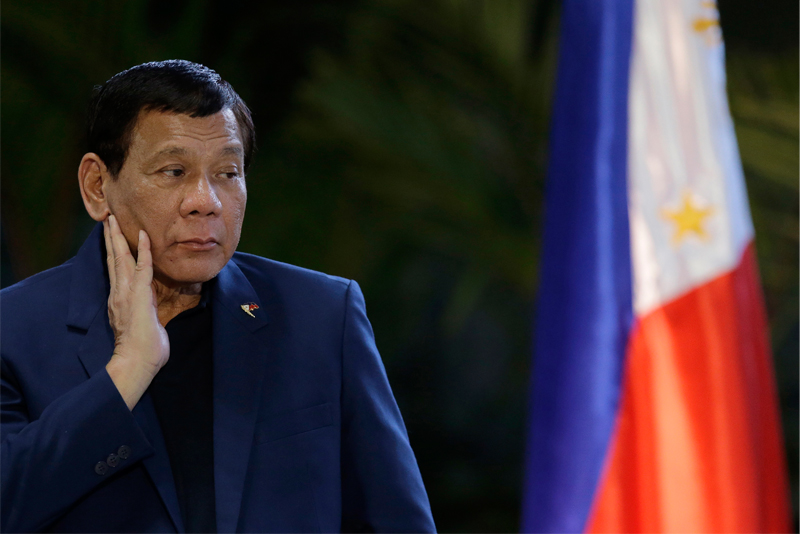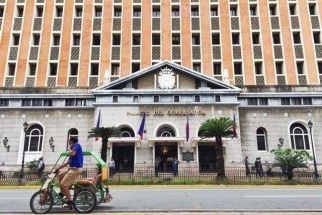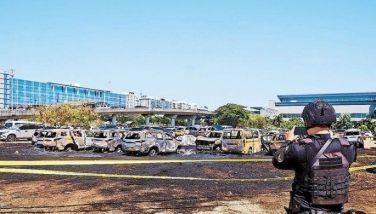What petitioners vs martial law will argue before the Supreme Court

The 15-member court will grill the petitioners seeking the nullification of the President Rodrigo Duterte's year-long extension of martial law in Mindanao and the respondent government officials, represented by the Office of the Solicitor General, through oral arguments on January 16, 2:00 p.m. and January 17, 10:00 a.m. AP/Aaron Favila
MANILA, Philippines — Congress has allowed President Rodrigo Duterte to place Mindanao under martial law until the end of 2018, effectively putting the region under military rule for a total of 526 days.
Two groups of petitioners have asked the Supreme Court for a halt order on the "re-extension" of martial law. The court, on Wednesday, set oral arguments on the petitions at 2 p.m. on January 16 and 10 a.m. on January 17.
The first to file petitions were seven opposition members of the House led by Rep. Edcel Lagman (Albay). Members of the National Union of Peoples' Lawyers and with representatives of opposition groups, on January 8, filed a second petition.
This is the second time that Duterte's martial law in Mindanao has faced petitions before the Supreme Court. When Duterte first placed Mindanao under martial law through Proclamation No. 216, three groups of petitioners sought its nullification.
Lagman, whose labor leader brother Hermon disappeared during Ferdinand Marcos' martial law in 1977, also led the first group of the petitioners to challenge the proclamation.
The 15-member court will grill the petitioners and the respondent government officials, represented by the Office of the Solicitor General at the oral arguments.
Named as respondents in the two petitions are:
- President Rodrigo Duterte
- Executive Secretary Salvador Medialdea
- Senate President Aquilino Pimentel III
- House Speaker Pantaleon Alvarez
- Defense Secretary Delfin Lorenzana
- Budget Secretary Benjamin Diokno
- Armed Forces of the Philippines Chief of Staff Gen. Rey Leonardo Guerrero
- Philippine National Police Chief Director General Ronald Dela Rosa
Here are some of the points raised in the two petitions:
Is a re-extension allowed in the Constitution?
Before Duterte's first martial law declaration—Proclamation No. 216—reached its 60-day deadline, the chief executive asked Congress to extend martial law until the end of 2017. On July 21, Congress voted 261-18 to extend martial law in Mindanao until the end of 2017. The session took almost 8 hours.
Early in December, Duterte manifested in a letter to Congress that he wants Mindanao to be put under martial law until the end of 2018. This second request only took less than half a day to be approved by the two houses of the Congress, in a vote of 240-27.
Lagman, in his petition, argues: "A reading of the constitutional provision on the congressional extension of martial law verily shows that the Constitution envisions an extension of 'such proclamation' (original proclamation) and not the extension of a previous extension."
The Constitution reads: "Upon the initiative of the President, the Congress may, in the same manner, extend such proclamation or suspension for a period to be determined by the Congress, if the invasion or rebellion shall persist and public safety requires it."
Lagman also raised the length of Duterte's extension of the military rule as "inordinately long." He pointed out that the "re-extension" is 876.67% longer than the original proclamation of 60 days.
"How can a mere extension be inordinately longer than the original proclamation sought to be extended?" Lagman stresses.
Does rebellion exist in Mindanao?
The SC, last year, junked the three consolidated petitions challenging Duterte's Proclamation No. 216. Voting 11-3-1, the high court held that rebellion staged by terrorist groups affected the entire Mindanao and justified Duterte's martial law.
During last year's oral arguments, the petitioners argued before the SC that rebellion does not exist in Mindanao. They stressed that safeguards were set in the 1987 Constitution against possible abuse of martial law.
In the two appeals challenging the extension of martial law, the petitioners once again raise the same argument: There is no rebellion in Mindanao.
The petitioners pointed out that under the 1987 Constitution, the phrase "imminent danger" was deleted from the 1936 Constitution—that allowed the martial law rule of the late strongman Marcos—as part of the safeguards against abuse of power.
Lagman, in his petition, reiterated: "'Rebellion' or 'invasion' is neither a state of mind nor a state of fear. It must be actual, not contingent. It must be real, not contrived."
They also argued before the SC that the military said that they are only fighting the "remnants" of the terrorist groups. They held that Mindanao need not be placed under martial law to "quell" the remaining forces.
Does the inclusion of NPA threat justify the extension?
Lawyers of the NUPL also questioned the inclusion of the threat imposed by the New People's Army in Duterte's ground for seeking the extension.
Maj. Gen. Restituto Padilla Jr., AFP spokesperson, confirmed in a July briefing that the members of the NPA are among the targets of Proclamation No. 216.
In a presentation by the military before the SC for the oral arguments last year, they said that one of the key tasks of the government forces was "to degrade armed capabilities of the NPA."
In his letter to Congress, Duterte reiterated the threats from Islamic State-linked extremists, local terrorists and communist rebels as the primary reason to justify the extension of martial law for another year.
But the petitioners point out: "No less than President Duterte himself belittled the capacity of the Communist Party of the Philippines-National Democratic in substantially impairing the functioning or supplanting the civilian government or authority."
The opposition groups said that the government, in its National Security Policy 2017-2022, notes that the CPP-NPA force dwindled from 26,000 in the 1980s to 4,000.
This, according to the petitioners, does not qualify as sufficient factual basis to impose martial law and suspend the privilege of the writ of habeas corpus.
The petitioners also pointed out that Duterte's inclusion of "alleged 'coddlers,' 'supporters,' and 'financiers'" in the grounds for extension "opens the floodgates to further attacks against just about anybody."
"The vagueness and ambiguity of said pronouncement sends a chilling effect that violates the people's right to exercise vital freedoms and liberties," the petitioners also said.
Did Congress commit grave abuse of discretion in approving Duterte's request?
The petitioners also claimed that the two houses of Congress committed grave abuse of discretion when it approved Duterte's request for extension.
Lagman pointed out that Congress limited the period of deliberation and interpellation of the invited resource speakers to only three minutes.
"Such three-minute limitation is excessively short for considering the President's request for extension for one full year of martial law and the suspension of the writ [of the privilege of habeas corpus] in Mindanao," the petition read.
They added: "The foregoing actuations of the respondent [Pimentel and Alvarez] together with their supermajority allies, smack of grave abuse of discretion characterized as 'capricious, whimsical, arbitrary or despotic manner in the exercise of jurisdiction as to be said to be equivalent to lack of jurisdiction."
The human rights lawyers, for their part, said that the Congress "failed to perform its duty under the Constitution to uphold the constitutional safeguards it is tasked to protect."
Section 18 of Article VII of the Constitution holds that: "The Supreme Court may review, in an appropriate proceeding filed by any citizen, the sufficiency of the factual basis of the proclamation of martial law or the suspension of the privilege of the writ of habeas corpus or the extension thereof, and must promulgate its decision thereon within thirty days from its filing.
- Latest
- Trending




























